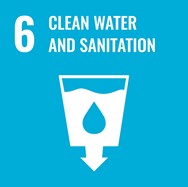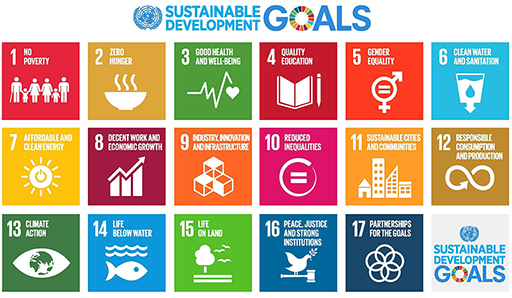10 The Sustainable Development Goals (SDGs)
Taking action to address global development issues such as climate change, environmental degradation, social injustice or food insecurity, requires extensive and sustained levels of cooperation and commitment by actors at many levels of society. The Sustainable Development Goals (SDGs) – a framework of 17 goals adopted in 2015 by the 193 member states of the United Nations (UN, nd: a) − set out to do just this.
The 2030 Agenda for Sustainable Development (UN 2015) set out to be far-reaching, people-centred, sustainable and transformative. The 17 Sustainable Development Goals (SDGs) that it established to achieve this provide a focus for collaboration between nations but also allow for diversity in approach. Each country decides what matters most to it and where it will target its energies and resources. Targets and indicators are associated with each goal.
The SDGs are global in the sense that they recognise that contemporary development issues are shaped by, and impact on, all countries, and that all need to be involved in addressing such issues as universal concerns. There is a focus on social transformation associated with achieving social justice through a radical transformation of economic, social, political and cultural systems so that resources are more equitably and sustainably shared. The SDGs cover structural issues such as the causes of poverty and economic inequality; social justice issues such as rights, inclusion and equity; policy issues such as peace, governance and human rights and environmental sustainability issues such as climate change and biodiversity loss.
The need for coordinated global action is reflected in SDG 17 which calls for a ‘global partnership for sustainable development’ involving not only cooperation between the governments of the world but also the involvement of private sector and civil society actors (https://sdgs.un.org/ goals/ goal17 [Tip: hold Ctrl and click a link to open it in a new tab. (Hide tip)] ). Such a process is intrinsically political and requires building new relationships, new understandings and new institutions. It is a process of learning to do things differently.
Activity 6: Interconnected SDGs
Read the list of facts and figures below that is provided on the UN Sustainable Development Goals website (UN, nd; b).
 |
Figure 10: SDG 6: Ensure access to water and sanitation for all. (Taken from Figure 9.) |
Look at Figure 9 which shows all 17 SDG goals or visit the SDG website. What other goals do you see as connecting to goal 6?
- 1 in 4 health care facilities lacks basic water services.
- 3 in 10 people lack access to safely managed drinking water services and 6 in 10 people lack access to safely managed sanitation facilities.
- At least 892 million people continue to practice open defecation.
- Women and girls are responsible for water collection in 80 per cent of households without access to water on premises.
- Between 1990 and 2015, the proportion of the global population using an improved drinking water source has increased from 76 per cent to 90 per cent.
- Water scarcity affects more than 40 per cent of the global population and is projected to rise. Over 1.7 billion people are currently living in river basins where water use exceeds recharge.
- 2.4 billion people lack access to basic sanitation services, such as toilets or latrines.
- More than 80 per cent of wastewater resulting from human activities is discharged into rivers or sea without any pollution removal.
- Each day, nearly 1,000 children die due to preventable water and sanitation-related diarrheal diseases.
- Approximately 70 per cent of all water abstracted from rivers, lakes and aquifers is used for irrigation.
- Floods and other water-related disasters account for 70 per cent of all deaths related to natural disasters.
Bulleted list source: Sustainable Development Goals website: Goal 6: Ensure access to water and sanitation for all
Comment
- Health (SDG 3: Ensure healthy lives and promote well-being for all ages) has obvious links to goal 3 as lack of access to clear water and sanitation impacts on health. The facts and figures show that nearly 1000 children die every day due to water and sanitation-related diseases.
- Poverty (SDG 1: End poverty in all its forms everywhere) is implied as well as lack of infrastructure (SDG 9: Build resilient infrastructure, promote sustainable industrialisation and foster innovation) such as water supply and sewage systems.
- Gender inequality (SDG 5: Achieve gender equality and empower women and girls) may be relevant as women and girls often bear responsibility for water collection and are vulnerable when having to practice open defecation.
- Discharge of untreated sewage and untreated wastewater into waterways and the oceans has adverse environmental consequences (SDG 14: Conserve and sustainably use the oceans, seas and marine resources).
- Justice is relevant (Goal 16: Promote just, peaceful and inclusive societies) as well as the need for collaboration and partnership (SDG 17: Revitalise the global partnership for sustainable development) in tackling lack of access to clean water and sanitation.

